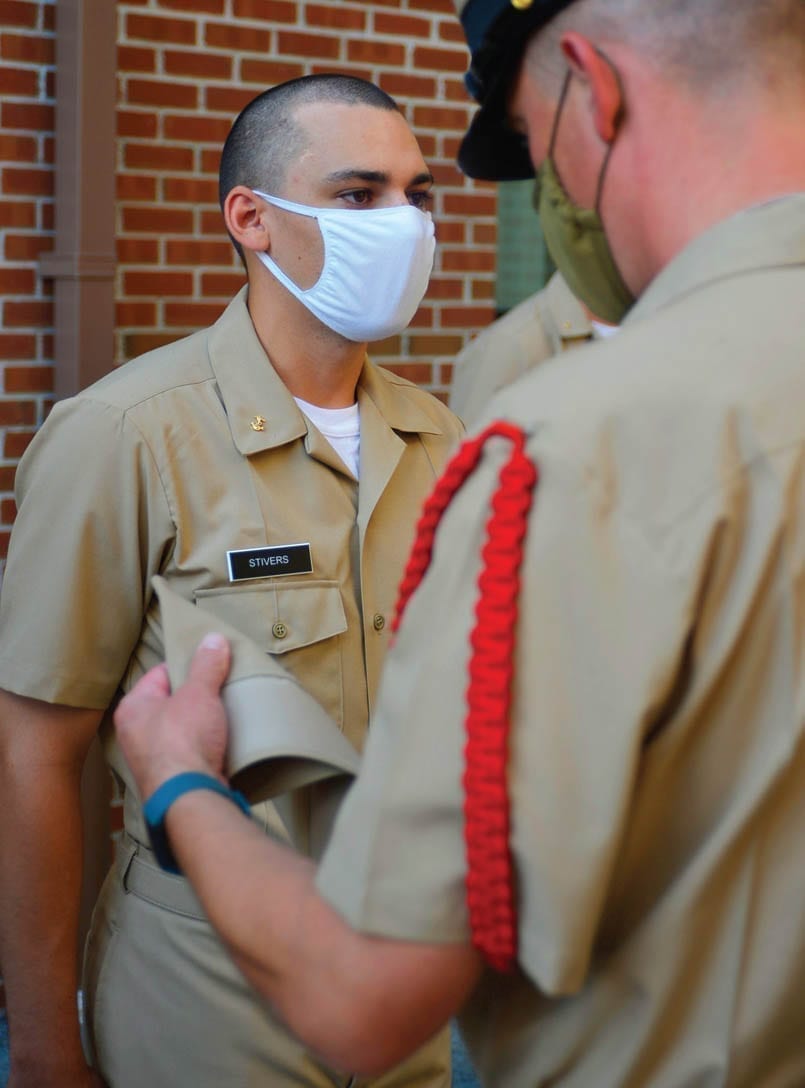29 Oct 2020 Naval Officer Stivers: Making waves in the water and in the classroom
by Dwain Hebda
Adam Stivers has accomplished more in 23 years than many people see in their whole lives. And, as the Cabot High School graduate and recently-commissioned Naval officer knows all too well, he’s just getting started.
This year, Stivers, who is married, graduated from the University of Arkansas and completed the Navy’s 13-week Officer Candidate School (OCS) in Newport, Rhode Island, and was commissioned an Ensign (L1). From there, he will go to Nuclear Power School in South Carolina, where he will continue his training to serve aboard the Navy’s nuclear submarines.

“Power School is six months, and then Prototype School is six months,” Stivers said of the road ahead. “The first six months is very class-heavy, with math and science courses. Then, the following six months is very hands-on learning on how to run nuclear reactors and things like that.”
Stivers grew up in a military household. His father was in the U.S. Air Force when he met Stivers’ mother in Egypt. Assignments included South Carolina and Puerto Rico before moving to Arkansas when Adam was in middle school. He said observing his father contributed to his desire to serve his country.
“I always grew up around [the military], so I had a pretty good understanding of what it was, and it had good appeal for me,” he said. “I’ve always been a fan of the military because of my dad.”
The other motivating factor, and what led him to the Navy specifically, was a desire to study nuclear engineering. But as no college or university in Arkansas offered that, he majored in mechanical engineering and physics in Fayetteville and joined the Navy’s Nuclear Propulsion Officer Candidate program (NUPOC). NUPOC is a subset of OCS specifically for individuals going into the nuclear engineering field.
“At one of the career fairs in college, there was someone recruiting for the NUPOC program,” Stivers said. “Once you express interest, your recruiter sets you up and you fly to San Diego and tour submarines, and they let you tour a destroyer, too, to get a feel for what you’re potentially getting into.
“Then, they fly you to Washington, D.C., and you have some technical interviews and you have an interview with the admiral of the nuclear Navy. If he accepts you, you’re in the program.”
Stivers barely had time to bask in his college diploma in May before reporting to OCS in June. He said even having grown up in a military household, the transition from civilian life was a real eye-opener.
“I originally didn’t think being away from my family, and my wife specifically, would be that difficult,” he said. “I mean, three months isn’t that long, but after being here for a little bit, that weighs on you more than you think it does. I wasn’t anticipating how heavy that would be on me.
“The other thing is, I thought Officer Candidate School was going to be sort of what I’m doing now at the end, which is applied leadership. But when you first get here, it’s not like that at all. It’s very focused on discipline and a lot of physical tests that you go through. So, the physical part and being away from family is a little bit more demanding than I originally thought it would be.”
Stivers said even in the Navy, steps must be taken to minimize exposure to the coronavirus. Officer candidates were quarantined for two weeks before commencing the program, they wore masks, maintained social distancing whenever possible and were restricted to base. He will repeat the quarantine for Power School, which is where he’ll learn the specifics of life and work underwater.
“It’s my understanding the first tour that we go on is basically learning your job,” he said. “You are potentially working toward becoming a DIVO (Division Officer), which is someone who’s in charge of pretty much everything that goes on in the sub.
“So, when you first get there, your job is really to learn everyone else’s job. You have to get qualified, as we call it, and you basically have to shadow everyone. You have to know how to drive the sub. You have to know how each person’s job individually works, and then you have to be able to basically do everyone’s job on the sub.”
Stivers is embarking on a five-year commitment to the Navy, but he has intentions to stay much longer. He said anyone considering following in his footsteps should mentally and physically prepare for what they are about to undertake.
“Number one, I would say do a lot of research to look into what exactly you want to do. Be specific; I wouldn’t broad-stroke and just say, ‘I want to go in this direction.’ I’d try to focus in on exactly what it is you want and what you’re looking to get from the military,” he said. “Once you get a direction, outline that as best you can and work on building yourself, and not just physically. Work physically, mentally, whatever you can. Keep up with yourself because that definitely helps you in the long run.”
- Conway couple called to serve foster children, families - March 10, 2024
- Artist of the Month: Terri R. Taylor - November 5, 2023
- Everybody loves a nut - November 5, 2023











